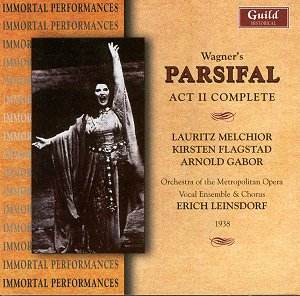Guild Music has an association with Immortal Performances
which has an archive of first-generation historic broadcasts from
the 1930s and 1940s. This initial release (the others are a complete
1943 Figaro, excerpts from a 1928 Boris Godunov with Chaliapin,
and a complete Siegfried from 1937) sets a standard hard to beat.
All the discs are transfers from the original transcription discs master
tapes, and transcripts of the complete Toscanini broadcasts from the
same period are also planned. So too is a complete and mouth-wateringly
cast Ring from the Met.
The current Guild series whose discs listed above I
have also reviewed on this site, offers up its fourth treasure, a complete
second act of Parsifal, with a filler provided by the last fifteen
minutes of the opera with Herbert Janssen partnering Melchior. Considering
that there were 21 performances of this opera at the Met between 1942
and 1947 (three or four each year) it was both a surprise and a scandal
to learn that none was broadcast. Melchior was a supreme Parsifal, ‘Amfortas!
Die Wunde’ (track 9) confirms that, while Kundry was nothing short of
sublime in her phrasing, with a kaleidoscopic variety of drama and vocal
colour being at the core of her interpretation. The wonderful discovery
of this recording on sixteen 12" aluminium discs in cartons stored
in a basement and, above all, the loving care taken by Richard Caniell
and his team patching it all together means that we can enjoy this miracle
casting despite its occasional glitches, clumsy joins, and variable
quality. The timbre of Melchior’s voice rises electrifyingly above such
technical problems to produce moments of radiance. The complex nature
of the roles of Parsifal and Kundry, how the former transforms from
a youth of naïve purity to the anguish brought about by the experience
of Amfortas’s wound, and how the latter is at one time a maternal figure,
then an alluring seductress, and finally shamefully acknowledging her
failure to corrupt Parsifal, all of which both Melchior and Flagstad
respectively master while clearly at the height of their vocal powers,
results in a memorable souvenir of a golden age.
The conductor is the youthful Erich Leinsdorf, at the
beginning of his Met career, who, according to the booklet ‘replaced
[Artur] Bodanzky for Act two’, but I wonder if this is so. In Leinsdorf’s
autobiography Cadenza (1976) he writes about his two-year contract
signed in 1938, the year of this Parsifal, ‘it was clearly understood
that I would, in addition to conducting a few works assigned to me,
spell [stand in for] my ailing chief [Bodanzky] when necessary. This
I gladly agreed to do with the proviso that I would not be asked to
do single acts, as had been Bodanzky’s habit … [he] would sit out a
second act and go back to his post for the third’. Just before the two
Easter 1938 performances (one on the Wednesday two days before Good
Friday and this one on Good Friday itself) Leinsdorf discovered by chance
that Bodanzky was being advised by his doctor not to conduct. Sure enough
at eleven o’clock on the Wednesday morning Leinsdorf was asked to take
over that night, which he did, but he then goes on, ‘By Good Friday
Bodanzky was able to conduct, for which I was very glad’. So is
it Leinsdorf at the helm of this second act, or, as it appears from
Leinsdorf’s own words, is it Bodanzky?
Christopher Fifield
Robert Farr has also listened to this disc
Wagner staging at the Met. in the 1930s and
1940s was a golden age, not known before, or equalled since. More by
circumstance than design many of these performances were broadcast by
NBC in their Saturday afternoon series and some were preserved. Influenced
by circumstances in Germany the greatest Wagner singers had migrated
to the Met. where memorable performances were the order of the day.
The presence of Melchior and Flagstad made the performances of Parsifal
vocally magnificent, particularly when Janssen or Schorr were also
singing. Regrettably none of those performances were broadcast and nothing
other than the written record remains. However, this one performance
was broadcast and pirate LPs were later issued on the EJS label, albeit
in barely listenable sound. Richard Canniel, the progenitor of this
series, and a researcher of the Met. broadcasts, discovered metal masters
professionally made for an enthusiast of Flagstad; it is from these
masters that the complete Act 2 is taken. The CD is filled with 14 minutes
of the finale of Act 3 taken from a later "Opera House of our Dreams
Series" recording.


